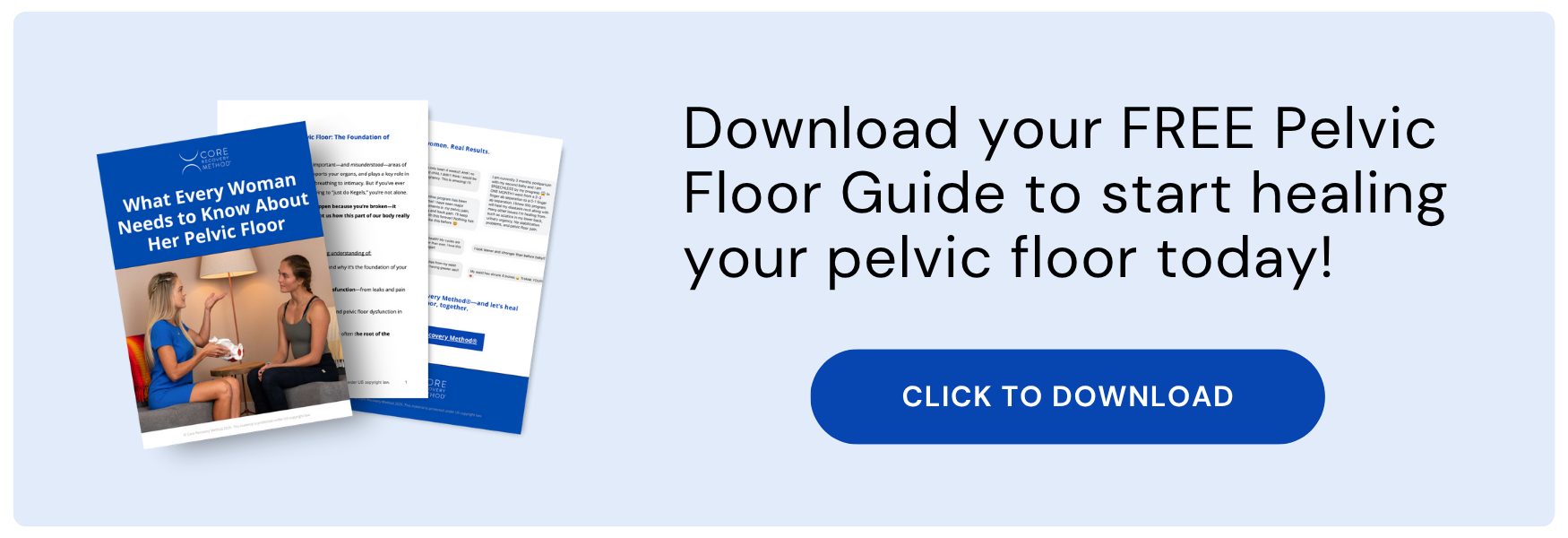How Workouts Can Trigger Bloating — And How to Fix It

Part One: Still Bloated No Matter What You Eat? Your Pelvic Floor Could Be to Blame
Part Two: How Workouts Can Trigger Bloating — And How to Fix It
Part Three: Core Practices That Get Rid of Bloating and Flatten Your Belly
Part Four: Why Bloating Gets Worse After Having Kids (And How to Fix It)

You push through a workout hoping to feel better, but instead you leave the gym looking more bloated than when you walked in. Your leggings are tighter, your belly is distended, and you're wondering why exercise is making everything worse.
This isn't all in your head - many traditional workouts actually sabotage your core system instead of supporting it.
Why Most Workouts Make Bloating Worse
The fitness industry has convinced people that "core work" means exercises like crunches and planks, but these exercises dramatically increase pressure inside your abdomen, force your organs downward and strain your pelvic floor. Your body compensates by creating even more tension in your core muscles, leaving you feeling tight, heavy, and more bloated than before you started.
There is also this trend of HIT training where you do as many reps as possible in a specific time frame. This often results in people compromising their posture and breathing for speed, and core injuries become incredibly common in this situation.
High impact activities like running and jumping can also make bloating worse when your core muscles are unable to properly support your organs and keep them in place as the pressure in your abdomen repeatedly increases.
"But working out is supposed to help my core! Working out should make me less bloated, right?"
I hear this question all the time, and the answer is not necessarily. If your core muscles are dysfunctional and not able to provide your organs and spine with proper support, then adding more stress (exercise) to this already compromised system, causes more harm than good.
See, the position of your organs is crucial for healthy circulation and for getting the blood, lymph, and nerve flow they need to function optimally. When your core muscles aren’t doing their job of keeping your organs lifted and centered, those organs can drop lower in your abdomen. As a result, circulation becomes compromised, and their function declines over time.
If your intestines and bowels are positioned low and compressed, they receive less blood flow. Digestion slows, constipation becomes more common, and bloating can feel constant. Add exercise into the mix, and things can get even worse. When your core muscles aren’t properly supporting your organs, your intestines end up bearing the load instead. This can lead to worsening bloating with exercise because that physical effort pushes your organs into even poorer positions and further restricts circulation to your digestive system.
The Cough Test will Give You Answers
Testing your core muscle function can give you valuable insights into which types of exercise might worsen your bloating and which ones could help. Your core muscles are designed to move in a very specific way when pressure in your abdomen increases — something that happens repeatedly during exercise.
One simple test is the cough test. Lie on your back and place your hand on your lower belly. Then, cough. If your belly pushes outward into your hand when you cough, it’s a sign that your core muscles aren’t functioning properly. In this case, high-impact exercise can actually make your bloating worse because your digestive system will end up taking the stress of the exercise instead of your core muscles. So if you have a positive cough test, choosing exercises like hypopressive training, walking while decompression breathing, stairs, hills, and swimming will reduce your bloating.... while running, jumping, HIT workouts, traditional "core exercises" will make your bloating worse.
"Core" Exercises to Avoid
Crunches and sit-ups push your organs down and increase pressure in your core. They can worsen a low belly bulge and increase that heavy, bloated feeling in your belly.
Planks create the same downward pressure, especially when you hold your breath or bear down during the exercise. It’s okay to move through this position, but holding it only builds unwanted pressure.
Leg-lowering exercises increase pressure, stress your lower back, and can trigger bloating, leaking, or even disc issues.
Signs Your Workout is Working Against You
When exercise increases abdominal pressure, your core and pelvic floor muscles should repeatedly and precisely move up and in to support your organs and spine with every impact and pressure spike. If you have a positive cough test and your core muscles are not functioning properly, then the pressure spikes of that exercise will push your organs down and cut off core circulation. When the organs keep getting jammed down and the blood flow is insufficient, your pelvic floor muscles either clamp down with excessive tension or completely give up. Neither response helps your body function properly during exercise. There are a few key signs that the form of exercise you are choosing is leading to the bloat.
Here’s what to look out for:
- Your belly bulges or domes during exercise. This is most obvious during crunches, sit ups, leg lowering, or when getting up from lying down. Pay attention if it happens during squats, lunges, walking or jumping.
- You consistently feel heavier and more bloated after exercising than before.
- You need to pee more during or right after workouts.
- Lower back pain develops during or after exercise sessions.
- You feel like you need to "suck in" more during and after working out.
If this sounds like you, dont worry. There is a simple protocol that will restore optimal core muscle function and allow your belly to finally be light, lifted and free.
Heal your Core Muscle function with The Core Recovery Method® so you can kick the bloat for good
The Core Recovery Method® will restore optimal core muscle function so that you can get back to the exercises you love without the bloat. If you have a positive cough test, I recommend temporarily taking a break from high impact exercise while you practice The Core Recovery Method® protocol and heal your core. Once your core muscle function is restored (and you have a negative cough test, meaning your belly draws in when you cough) then you will be safe to resume the high impact exercise that once made you bloated, and you can rest assured your core muscles will lift and support your organs so that your exercise improves digestion, not the other way around.
Many women who face this problem, either try to exercise even harder, or they start avoiding exercise altogether. But both of those responses are not helpful. Let’s talk about choosing movements that facilitate proper core function and can help reduce bloating when paired with proper breathing and posture.
Start with coordination, not intensity. Your core muscles need to learn proper function before adding an additional challenge. Focus on gentle, controlled movements where you can really focus on optimal breathing and posture in order to teach your abs, pelvic floor, and diaphragm to work together.
Choose low-impact exercises, like hill walking and swimming, that encourage internal lift rather than downward compression. Decompression breathing techniques will support your movements instead of creating pressure.
Most importantly, listen to your body. Exercise should leave you feeling energized and lighter, not bloated, heavy, or uncomfortable.
The Core Recovery Method® takes a completely different approach to movement and exercise. Instead of forcing your body to try to adapt to pressure-increasing exercises, this protocol trains your body to automatically reduce pressure with every breath and every movement so that function can be truly restored.
This approach emphasizes teaching your core muscles to coordinate as a team rather than just doing mindless reps. When your pelvic floor, diaphragm, and deep abdominals work together properly, exercise supports your digestion instead of disrupting it.
The Core Recovery Method® also restores healthy circulation to your core, ensuring your organs get the blood, lymph, and nerve flow they need to function well during movement. The result? Workouts that leave you feeling lighter, more energized, and confident in your body.
Exercise should not make your bloating worse!
When your core muscles function properly, physical activity becomes something that enhances your health rather than creating more problems.
You can move your body with confidence, knowing that your workout will leave you feeling better, not worse. Your digestive system works with you instead of against you, and that post-workout bloat becomes a thing of the past.
Your body isn't broken - it just needs the right approach to heal and function optimally again.



